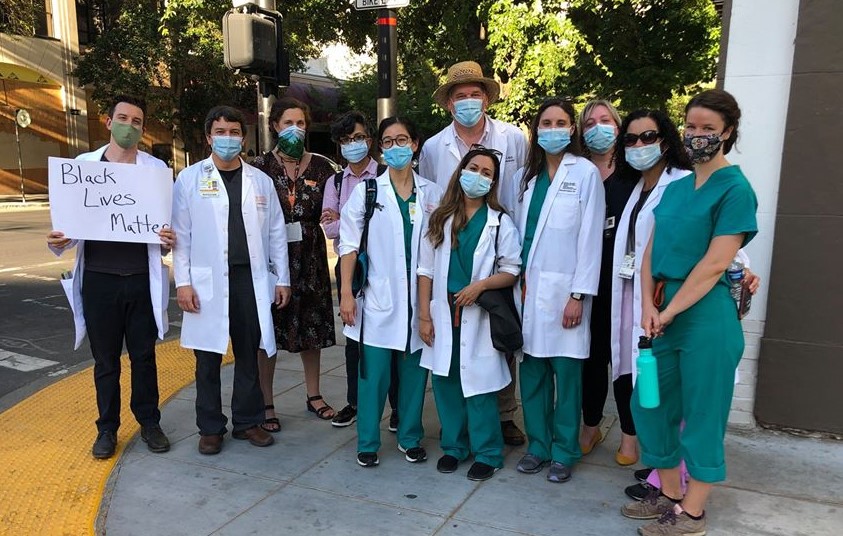We are a mosaic of our experiences, lifestyle, social and family connections, education, successes and struggles. Apply those factors to our health, and a complex formula arises that clinicians commonly call the patient experience.
Learning the skills to assess these factors and deliver compassionate care to patients is what Sutter’s family medicine resident physicians aim to enhance. The newly enhanced Human Behavior & Mental Health curriculum is helping lead the way.
“We encourage faculty and residents to think about context, systems and dynamics within population health to address social determinants of health,” says Samantha Kettle, Psy.D., a faculty member in Sutter’s Family Medicine Residency Program.
She and colleague, Andy Brothers, M.D., a family medicine physician in Sacramento and faculty member in the residency program, are bringing health equity to the patient experience and training family medicine residents in Sacramento and Davis.

Seven residents each year learn to screen patients for social determinants of health (such as financial challenges, environmental and physical conditions, transportation needs, access to care and social factors) that may impact patients’ risk of depression and anxiety, substance use disorder and suicide.
This year’s residents may train in addiction medicine, psychotherapy, chronic pain, spirituality in medicine, well-being and the field of medicine that supports those who are incarcerated.
And in a community as diverse as the Sacramento Valley Area, statistics suggest these factors may significantly impact the health of its residents:
• 15.9% of California adults have a mental health challenge(1)
• Nearly 2 million Californians live with a serious mental challenge
• Substance misuse impacts 8.8% of Californians
• The prevalence of mental health challenges varies by economic status and by race/ethnicity: adults living 200% below the federal poverty level are 150% more likely to experience mental health challenges; 20% of Native Americans and Latinos are likely to have mental health struggles, followed by Blacks (19%), Whites (14%) and Asians (10%).
“Taking care of our local population’s health is a moral imperative,” says Dr. Kettle. “Many residents have entered our program to continue their quest in helping people in underserved communities.”
For instance, third-year Sutter family medicine resident Mehwish Farooqi, M.D., is studying ways to screen for post-partum depression using an approach developed through the ROSE (Reach Out, Stay Strong, Essentials for mothers of newborns) program.
“Women are most vulnerable to mental health concerns during the post-partum period: as many as one in seven women experience PPD. ROSE is a group educational intervention to help prevent the diagnosis, delivered during pregnancy. It has been found to reduce PPD in community prenatal settings serving low-income pregnant women,” says Dr. Farooqi.
“Sutter has clearly demonstrated a commitment to health equity and social justice that has propelled our residency program toward a future vision of health care in which all patients are cared for as individuals with unique life stories, struggles and successes,” says Dr. Brothers.
Advancing Social Determinants of Health through Graduate Medical Education at Sutter:
Other family medicine programs across Sutter’s integrated network incorporate health equity into ambulatory training for residents. The family medicine faculty at California Pacific Medical Center include a social worker who teaches residents to address concerns like financial and food insecurity, as well as social isolation. Residents learn how to care for people with depression and anxiety, and lecture series are offered on topics like addiction medicine and chronic pain/narcotic management.
Sutter Santa Rosa Regional Hospital’s Family Medicine Residency Program incorporates social justice through a Community Engagement and a Diversity Action Work Group—a committee comprised of faculty and residents who help tackle issues around inequity and structural racism.
“We are committed to strengthening a relationship between the residency program and the diverse communities we serve, guided with cultural mindfulness and compassion in our pursuit of overall wellness for all,” says Tara Scott, M.D., Program Director of the Family Medicine Residency Program in Santa Rosa.
• Learn more about Sutter’s Family Medicine Residency Program.
• Find out how Sutter is advancing health equity.
Reference:
- California Department of Health Care Services.





